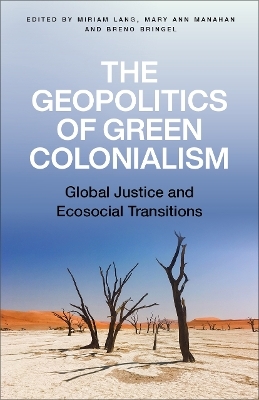
The Geopolitics of Green Colonialism
Pluto Press (Verlag)
978-0-7453-4934-3 (ISBN)
The time for denial is over. Across the Global North, the question of how we should respond to the climate crisis has been answered: with a shift to renewables, electric cars, carbon trading and hydrogen. Green New Deals across Europe and North America promise to reduce emissions while creating new jobs.
But beneath the sustainability branding, these climate 'solutions' are leading to new environmental injustices and green colonialism. The green growth and clean energy plans of the Global North require the large-scale extraction of strategic minerals from the Global South. The geopolitics of transition imply sacrificing not only territories, but truly sustainable ways of inhabiting this world. A new subordination in the global energy economy prevents societies in the South from developing sovereign strategies to foster a dignified life.
This book provides a platform for the voices that have been conspicuously absent in debates around energy and climate in the Global North. Drawing on case studies from across the Global South, the authors offer incisive critiques of green colonialism in its material, political and symbolic dimensions, discuss the multiple entanglements that forcefully connect the transitions of different world regions in a globalised economy, and explore alternative pathways toward a liveable and globally just future for all.
Miriam Lang is an activist academic who works as Professor of Environment and Sustainability at the Universidad Andina Simón Bolívar, Ecuador. She holds a PhD in Sociology and a Masters in Latin American Studies from the Free University of Berlin. She is a member of the Ecosocial and Intercultural Pact of the South and the Latin American Permanent Working Group on Alternatives to Development and has co-coordinated the Global Working Group Beyond Development since 2016. Her research focuses on the critique of development, systemic alternatives and the territorial implementation of Buen Vivir, combining decolonial and feminist perspectives with political economy and political ecology. A Filipina feminist and activist researcher, Mary Ann Manahan is currently a doctoral assistant with the Conflict Research Group of the Department of Conflict and Development Studies at Ghent University in Belgium. Since 2020, she has also been the co-coordinator of the Global Working Group Beyond Development. Formerly, Manahan was a Senior Program Officer with the Asian-based Focus on the Global South NGO, and coordinator of the IFI Advisory Board of the US-based grassroots grant-making organisation, Global Greengrants Fund. Her recent research focuses on the intersections of indigenous people's struggles for self-determination, forest conservation and alternatives to development. Breno Bringel is a Brazilian-Spanish activist, scholar and editor. He is a Professor of Sociology at the State University of Rio de Janeiro and a Senior Fellow at the Universidad Complutense de Madrid, where he coordinates the Observatory on Geopolitics and Socio-Ecological Transitions. He is a member of the Ecosocial Pact of the South.
Acknowledgements
Lucrative Transitions, Green Colonialism and Pathways to Transformative Ecosocial Justice: An Introduction - Miriam Lang, Breno Bringel and Mary Ann Manahan
PART I: Hegemonic Transitions and the Geopolitics of Power
1. Global Energy Transitions and Green Extractivism - Kristina Dietz
2. Corporate energy transition: The South American Lithium Triangle as a Test Case - Maristella Svampa
3. Decolonising the Energy Transition in North Africa - Hamza Hamouchene
4. Can the Greatest Polluters Save the Planet? Decolonisation Policies in the US, EU and China - John Feffer and Edgardo Lander
5. Accumulation and Dispossession by Decarbonisation - Ivonne Yanez and Camila Moreno
PART II: Analysing Green Colonialism: Global Interdependencies and Entanglements
6. The Continuity and Intensification of Imperial Appropriation in the Global Economy - Christian Dorninger
7. Taking on the Eternal Debts of the South - Miriam Lang, Alberto Acosta and Esperanza Martínez
8. What to Expect from the State in Socio-ecological Transformations? - Ulrich Brand and Miriam Lang
9. Green Colonialism in Colonial Structures: A Pan-African Perspective - Nnimmo Bassey
10. Under the Yoke of Neoliberal ‘Green’ Trade - Rachmi Hertanti
11. ‘Nature-Based Solutions’ for a Profit-based Global Environmental Governance - Mary Ann Manahan
PART III: Horizons Toward a Dignified and Liveable Future
12. Resist Extractivism and Build a Just and Popular Energy Transition in Latin America - Tatiana Roa Avendaño and Pablo Bertinat
13. Eco-feminist Perspectives from Africa - Zo Randriamaro
14. A Feminist Degrowth for Unsettling Transition - Bengi Akbulut
15. Degrowth, Climate Emergency and Transformation of Work - Luis Gonzalez Reyes
16. Nayakrishi Andolon: Alternatives to the Modern, Corporate Agri-Food System in Bangladesh - Farida Akther
17. Designing Systemic Regional Transitions: An Action-Research Experience in Colombia - Maria Campo and Arturo Escobar
18. Towards a New Eco-Territorial Internationalism - Breno Bringel and Sabrina Fernandes
| Erscheinungsdatum | 13.03.2024 |
|---|---|
| Verlagsort | London |
| Sprache | englisch |
| Maße | 140 x 216 mm |
| Themenwelt | Geisteswissenschaften ► Geschichte |
| Naturwissenschaften ► Biologie ► Ökologie / Naturschutz | |
| Sozialwissenschaften ► Politik / Verwaltung ► Politische Theorie | |
| Sozialwissenschaften ► Soziologie | |
| Technik ► Elektrotechnik / Energietechnik | |
| Technik ► Umwelttechnik / Biotechnologie | |
| ISBN-10 | 0-7453-4934-X / 074534934X |
| ISBN-13 | 978-0-7453-4934-3 / 9780745349343 |
| Zustand | Neuware |
| Informationen gemäß Produktsicherheitsverordnung (GPSR) | |
| Haben Sie eine Frage zum Produkt? |
aus dem Bereich


